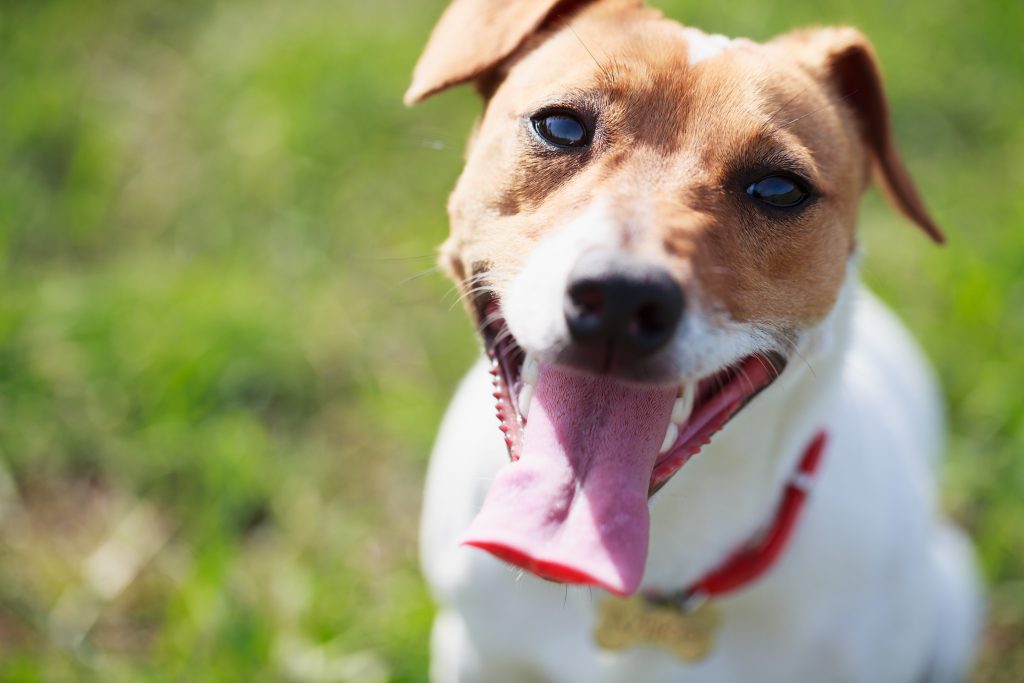From cuts on their paws to uneasy stomachs, dogs aren’t always forthcoming with their injuries or illnesses. Constipation is something you wouldn’t automatically think your dog may suffer from, but it happens more frequently than you might think. That’s because there is a long list of things that can cause constipation in dogs preventing your dog from producing regular bowel movements.
Although you may be well attuned to your dog’s bowel movement habits, as in how often you have to take him out to go to the bathroom, you may not necessarily be counting every time he’s produced a stool or what it looked like. Also, since a dog’s diet may accidentally include scraps of food from the kitchen table, remnants of trash, or anything else he gets his mouth on outside, you may not realize what he’s digested.
However, there are signs and symptoms of constipation to look out for, as well as home remedies and alternative therapies to consider when it comes to constipation in dogs. And when in doubt, it’s always best to seek the recommendations from your pet’s veterinarian who already knows your dog’s medical history and behaviors. Chronic constipation isn’t fun for anyone, even your dog. There are many options for treating dog constipation including a high-fiber diet, stool softeners for dogs, and more.
Signs of Dog Constipation

When you dog is constipated, it may be several days before he’s able to produce a stool, or the stools he does produce may be very solid and lack any moisture.
Also, if your pet appears to be having trouble defecating or seems to be in pain, then something else might be going on in his colon or digestive tract. Other signs can include bloating, lethargy, and behavioral changes indicating discomfort or pain. In mild cases, your dog’s constipation will clear up on its own, but if your pup has been struggling with signs of constipation for a few days, then make an appointment with your veterinarian to get things checked out. Veterinarians are familiar with treating constipation in dogs and will be able to help you identify the symptoms of constipation, so don’t be embarrassed or worried.
Be as descriptive as you can when you take your dog in – your veterinarian has most likely heard and seen it all, so don’t hold back. It can help the doctor know what their next steps should be to treat constipation.
Symptoms of Dog Constipation
There are notable symptoms that might mean trouble for your dog. If there is redness around the anal area, leaky discharge, or swelling, your dog may be constipated. Your pet may also exhibit signs of depression, lack of appetite, or overall discomfort.
Have you noticed a change in behavior? Has your dog lost a significant amount of weight? Is he scooting around the house more than normal? He may be in pain and these behaviors are the only way he can express his discomfort.
Why Does My Dog Get Constipated?
Dog constipation typically occurs when there’s a blockage in the colon. This can be attributed to diet, lack of fluid or water intake, and sometimes it can be a reaction to a new medication or something your pet has come into contact with and ingested.
That’s why keeping an eye on your pet’s dietary habits is important. This is especially so if you’ve recently welcomed a new dog to your home. Since you’re getting used to his daily habits, including meal and snack times, it can be tempting to overfeed your pet if he still seems hungry.
However, too much food and not enough water can be a recipe for disaster later on. Make sure you’re allocating the recommended amounts for your dog’s breed and always ensure he has a full dish of fresh water.

Additionally, if your dog has a habit of digging into the garbage, eating anything that crosses his path when outside, or chews on your shoes, furniture, etc., then he may eat items that affect his digestion and may subsequently result in constipation.
Since this most likely is an irregular occurrence, you may not have to worry about your dog’s condition long-term. It’s frequent instances of constipation that you have to worry about.
Your dog’s age may also be a factor if it seems like your pet is suffering from constipation on more regular occasions. Older dogs tend to experience constipation more often than young pups. It can be due to the effects of aging or might be a precursor to more serious illnesses or injuries.
Also, if your pet has recently undergone a surgery or procedure, he may be more prone to becoming constipated as well. In more serious cases, your veterinarian my want to perform x-rays to get a better look at what’s causing the condition. It could be a result of arthritis, infections, or polyps. Monitor the symptoms your dog is experiencing and if they aren’t getting any better and haven’t been resolved over a few days, make an appointment with your veterinary team.
Can Dog Constipation Be Treated at Home?
If you’re wondering what to give a constipated dog, there are a few remedies you can try at home before making an appointment with the veterinarian.
1. Increase Water Intake
The first treatment method is giving your dog plenty of water and a well-balanced diet. Sounds easy enough, but you might be surprised how little your dog is drinking throughout the day. This is especially true in the summer when your pet may be more active and prone to overheating.
Hydration around-the-clock can help him be more regular. Make sure there is a cool, fresh supply of water both outside in the shade and indoors for your pet.
2. Canned Pumpkin
Certain foods may also help your dog with his constipation. Canned pumpkin is one source of fiber that can help “move things along” so to speak. Canned dog food is another remedy to try versus his normal hard food because the added moisture may help aid digestion and provide more liquid intake.
3. Milk
If you don’t want to buy new dog food, add a bit of milk or water to his normal food dish to soften them up and add more liquid. Try different things until you find something that works for your pet.
4. Exercise
Taking your pet for a walk or playing outside may also help get the blood circulation going and can help ease discomfort and increase relaxation.
5. Olive Oil or Mineral Oil
Oils can help move things along for dogs. Be sure to not give them too much or else it may cause diarrhea. It’s best to mix into your dog’s food instead of directly into their mouth since it feels different than food and they may not swallow properly.
If your pet is suffering from constipation due to high stress, this activity can help with his overall wellness. Since some instances of constipation are short-lived and don’t occur often, trying at-home remedies first can save you a trip to the veterinarian.
When to Head to the Vet
You know your dog’s behavior better than anyone so you’ll probably know when something isn’t right. But if you’ve tried home remedies and still aren’t sure what exactly is wrong, a visit to the veterinary clinic can help answer some questions for you and get the diagnosis you need.

If your dog is suffering from severe constipation, the veterinarian can examine your dog more closely and remove any impacted feces, if necessary. They can also check for other symptoms, run blood tests, and give you a clearer picture of what’s wrong your dog and possibly prevent anything more serious. Sometimes it’s not knowing that’s the most frustrating, so gain peace of mind from a veterinary professional who’s handled it all before.
This is when it’s important to have as much information as possible to provide so you can figure out the best way to treat constipation. Notate when your dog began having constipation problems, what other signs you’ve witnessed, and anything you can remember leading up to these issues.
If this is the first time your dog has been constipated, your veterinarian will want to know that, too. Also, be upfront about any home treatments you’ve tried and any changes your pet has recently experienced, whether that’s a new home or a new diet.
All of this information is helpful and can ensure your dog is being treated for the appropriate condition. In rarer instances, your dog may have to undergo surgery to fix the problem, but that’s only if there is damage to his colon, digestive tract, or your veterinarian finds something else that’s wrong. In these cases, constipation is a symptom of a bigger issue.
The veterinarian will also teach how you to feel along your dog’s abdomen to identify constipation in the future and can recommend fiber-rich treats that can also help as well. Other remedies that may help include: laxatives, milk of magnesia, mineral oil, or bran- or oat-based treats. Consult with his doctor and find a treatment plan that works best.
Follow-Up Care After Constipation
To prevent chronic constipation from reoccurring, make sure you keep a careful watch over your pet’s diet. Communicate food sensitivities with friends and family who may come over and visit, as well as with your dog’s daycare or dog walker, if necessary. You never know how often your pet is being sneaked treats that might be making him sick. If your dog has been prone to constipation in the past, it’s better to have his diet regulated by you and you alone.
Water will definitely help to keep your pet hydrated and aid in any digestive issues. Remember, too, that constipation in your dog may be a one-time occurrence and not something you may have to worry about again. Tracking your pet’s health will help you identify unusual symptoms faster and get him the treatment he needs more quickly.
Of course, we can’t watch our pets every minute of the day but the more we pay attention, the easier we can help prevent potential problems in the future.

Alternative Wellness Remedies for Your Dog
Some dogs may suffer more illnesses or health conditions than others, and trips to the veterinarian may be more frequent than you’d like. In addition to ensuring a healthy diet for your dog, some pet owners turn to alternative medicine and homeopathic remedies to help their pet feel its best. This might include massage therapy, acupuncture, and/or herbal supplements.
These types of treatments are more focused on helping to ease your dog’s discomfort or pain, promote healthy blood circulation, and alleviate stress your dog might be feeling. Same as adults, pets sometimes bounce back quicker when their overall wellness is attended to on a regular basis.
Not all pets will respond to traditional treatments in the same way. If you’re looking to try something new for your pet, discuss your options with the veterinarian and monitor the success along the way.
Above all, consider your options when it comes to the health of your pet. Understand what your dog responds best to in terms of treatment and how you can present the healthiest type of lifestyle. It’d be nice if dogs could just speak up when something is wrong or when they’re in pain, but since pet owners have to rely on their reactions and non-verbal cues, it’s important to pay close attention to anything they may be trying to communicate.
Sources:
- “Constipation in Dogs: Causes and Treatment.” WebMD, Accessed 28 Aug. 2017. www.pets.webmd.com/dogs/dog-constipation-causes-treatment.
- “Dog Constipation and How to Treat It Naturally.” Healthy Pets, Accessed 28 Aug. 2017. www.healthypets.mercola.com/sites/healthypets/archive/2010/11/11/constipation-in-pet-dogs.aspx.
- “Dog Constipation: Causes, Symptoms, and Treatments.” Cesar’s Way, 19 June 2018, Accessed 28 Aug. 2017. www.cesarsway.com/dog-care/routine-care/dog-constipation.
- Dogtime. “Dog Constipation: Symptoms, Causes, And Treatments.” Dogtime, 23 July 2018, Accessed 28 Aug. 2017. www.dogtime.com/dog-health/294-constipation.
- “Five Ways to Help Your Constipated Dog.” PetMD, Accessed 28 Aug. 2017. www.petmd.com/dog/slideshows/five-ways-help-your-constipated-dog.






